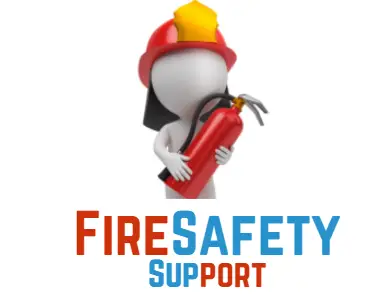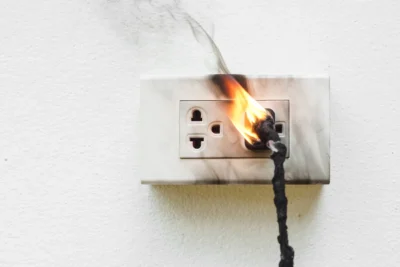The risk of an electrical fire in walls is a serious concern for homeowners, and it’s important to understand the risks and how to prevent them. One will only get to react to electrical fire in walls when you know the signs of electrical fire in walls. This post reveals some of the signs you should look out for.
Some of the signs include sparks, popping or buzzing sounds coming from the wall, burning or melting plastic or paint, discoloration or bubbling, and the smell of smoke in the house. If you notice any strange smells coming from your walls (like burning plastic), that could also indicate a fire in the walls.
If this happens, don’t ignore it. Strange smells are a stronger sign that something might be wrong with your electrical system and could lead to serious consequences if left alone for too long.
No products found.
What is electrical fire?
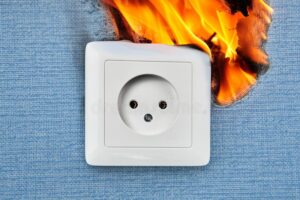
Electrical fire is a type of fire that is caused by electricity. Fires are common; they happen when electrical wiring malfunctions or from faulty appliances and equipment.
Also, electrical fires can be started by short circuits, overloaded circuits, and damaged equipment. In some cases, a fire may be caused by poor wiring or an improperly installed appliance.
A short circuit is an electrical problem caused when two wires connect together in an unintended way. This can happen when wires touch each other inside a junction box or due to loose connections at switches or receptacles (outlets). When a wire short out, it creates heat and sparks that can start a fire if there are combustible materials nearby.
Overloading circuits with too much power can also lead to electrical fires because it causes excessive heat build-up in the wires, which results in overheating and sometimes sparking.
Damaged equipment such as motors and transformers can overheat due to worn insulation on their windings which causes arcing between these windings when they start up again after being shut down (the arcing produces heat).
If there are flammable materials around them (such as wood), then this could cause an electrical fire if not properly handled by trained professionals.
Causes of electrical fire in walls?
The causes of electrical fire in walls are:
1. Wiring that is not properly installed
Wires that are poorly wired and loosely attached to the outlet can cause electrical fires. If the wires are loose, they will vibrate and eventually break, which could cause sparks and an electrical fire.
2. Faulty or damaged circuit breakers/fuses
Faulting or tripping circuit breakers can cause an electrical fire because there is no longer a way to stop power from flowing to the source of the problem.
This means that if something goes wrong, such as if a wire becomes loose or damaged, there will be no way to stop power from flowing through that wire, causing an electrical fire.
3. Loose or damaged wires
Another common cause of electrical fire in walls is that the wires become loose or disconnected from their outlet, which causes them to short-circuit and start a fire when electricity flows through them.
If you notice any loose or disconnected wiring around your house, call an electrician immediately so they can fix it before anything else happens.
4. Overloaded circuits
Overloaded electrical circuits are a top cause of fires in America today. Have your electrician verify how many circuits you have and what appliances you’re using on each.
Look for signs like flickering lights, tripped breakers, and hot spots on walls. Get in the habit of turning everything off when you leave the room (even your cell phone charger) or unplugging it from the wall if it’s not in use.
5. Poorly installed wiring devices (such as switches and plugs)
Poorly installed wiring devices can cause electrical fires in walls. Always hire a licensed electrician to install and inspect your home’s electrical system. These devices should be rated for outdoor use, resist water damage, and have a three-pronged plug.
6. Damaged electrical outlets
Damaged electrical outlets can lead to fires, so it is important to repair damaged switches and outlets as soon as they are discovered. In addition, you should check the electrical wiring in your home at least once every year to make sure it is safe and not cracked.
7. Damaged light fixtures
Faulty or damaged light fixtures are a leading cause of electrical fires in walls. They can overheat, causing damage to the fixture and an increased risk for fire. Damaged light fixtures should be replaced immediately by an electrician or your local hardware store.
8. A sunspot (a large solar flare that disrupts the earth’s magnetic field)
A sunspot can appear on your wall, which means that a fire has started. To stop this, you need to turn off the electricity in your home and call your electrician.
No products found.
Signs of electrical fire in walls?
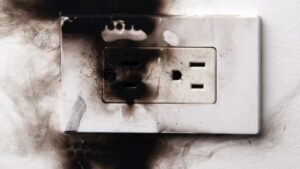
There are some signs that you do not know, which tells you early that there may be fire In your walls. So, some of the signs are what I have listed below for you.
1. Sparks
If you notice sparks around the electrical wiring in your walls, contact a licensed electrician to evaluate the situation immediately. Sparks may indicate an electrical fire has started and is hidden inside the walls.
2. Popping or buzzing sounds are coming from the wall.
Often the best warning sign of an electrical fire in your walls isn’t flames but a popping and buzzing sound coming from your walls. If you hear strange noises coming from your walls, causing you to wonder if you have an electrical problem in your house, contact a professional immediately.
3. Burning or melting plastic or paint
Burned plastic, melted electrical wire insulation, and damaged wallpaper is all signs of an electrical fire. If you find any of these things behind your walls, it’s time to call an electrician.
4. Smell of smoke
The most common signs of electrical fire in walls are smoke, soot, and sparks. These signs can be seen through any part of a wall or ceiling, including the room where the fire started. So, if you think you may have detected the scent of smoke, quickly contact an electrician or fire department immediately.
What does electrical fire smell like?
Electrical fire smell like burning wiring or the smell of burning plastic. It’s very similar to that of regular fire, but the difference is that electrical fires are often accompanied by a popping sound and sparks.
If you smell an electrical fire, you should get out of the building immediately. Do not attempt to put it out yourself, as you could get electrocuted by your own attempts at extinguishing the fire. Instead, call 911 and let them know what you’re dealing with so they can send someone who knows what they’re doing to help you out.
How to put out an electrical fire in walls?
If you’ve got an electrical fire in your walls, you may be tempted to just let it burn itself out. But that’s not a good idea. Electrical fires can produce toxic fumes, and they can spread to other areas of your home.
Here’s how to put out an electrical fire in walls:
- First things first: turn off the power at the breaker box or fuse box. If you don’t know where that is, ask someone who does (like your landlord).
- Now open up the wall where the fire is happening and put out any flames with a fire extinguisher. If you don’t have one handy, use baking soda or dry sand instead (but not water!).
- Check for hot wires before sticking your hand into the hole in the wall where you put out the fire, as they may still be hot.
If there are any wires that feel warm or hot, use a pair of insulated pliers to cut them away from their connecting points and then cover them with masking tape until they cool down completely (about 30 minutes later).
No products found.
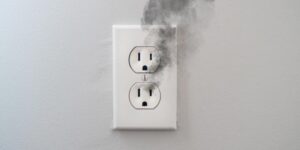
How to get rid of an electrical burning smell in the house?
If you have an electrical burning smell in your house and want to get rid of it, try these steps:
Make sure your air conditioning unit is set to “cool” mode. This will help keep the temperature in your house low, which will help reduce the chances of electrical burning smells.
Also, make sure all of your electrical appliances are off before going to bed. This includes everything from light switches to power outlets, microwaves, and more. If you need to leave something on overnight (like a lamp), make sure it’s plugged into a surge protector so that if there is an electrical fire, it will be contained by the surge protector.
You can also use a fire-safe extension cord if you’re worried about overheating or melting from using too much power at once on one outlet or socket. Also, you can make use of air fresheners in your home. You can get anyone from the market and spray your home with it.
Is electrical burning smell toxic?
An electrical burning smell is usually not toxic, but it can be. The burning smell you get from an electrical short circuit or overload is usually caused by some type of insulation failure.
This means that it’s not actually the wire itself that’s burning but rather the insulating material around it. This can be dangerous, as these insulators aren’t designed to burn like paper or wood. They release smoke and toxic gases instead.
The best way to find out if your electrical burning smell is toxic is by testing the air in your home for carbon monoxide, which is one of those gases released by burning insulation material.
How does a fire start in a wall?
The most common way that a fire starts in a wall is when there’s an electrical fault. This can be caused by an overload or by faulty wiring. If electricity passes through the wall, it can set fire to combustibles like wood and paper.
Another way is if something heats up inside the wall. For example, if you leave a heater on too long and it starts to overheat, it can set fire to combustibles like wood and paper.
Sometimes fires are caused by arsonists who want to burn down buildings or cause other damage. They might sabotage electrical wires or use Molotov cocktails to start fires in walls.
No products found.
Is there a smell before an electrical fire?
A smell is one of the first signs that something is wrong with your electrical system. If you smell a burning odor, it’s time to check your electrical panel and all of your outlets, switches, and light fixtures.
If you notice any of the following problems in your home, contact an electrician immediately:
- Burning or scorching smells coming from an outlet or switch that has been turned off.
- Smoke coming from a light fixture or outlet box.
- Scorched or melted wiring insulation on non-grounded wires (white wire).
Can an electrical fire start if nothing is plugged in?
Yes, electrical fires can start even if nothing is plugged in. This is because the wires themselves can overheat and cause a fire. For example, if you have an old light bulb that has been sitting unused for years, its filament may have broken down and become brittle. If the filament breaks while the lamp is plugged in, it can start a fire.
Another way that an electrical fire can start when nothing is plugged in is if there’s moisture or rust inside your electrical sockets or switches. This can make them short out and since electricity travels through water and water conducts electricity, this will cause sparks that could ignite a fire.
Can an electrical fire in the wall burn the house?
Electrical fire in the wall can burn the house. The best way to keep your house safe from electrical fire is by having an electrician check your wiring before you install anything new in your home.
If you’re installing a new appliance or light fixture, make sure that you use a qualified electrician who has experience with all types of wiring.
If you already have an electrical fire in the wall, call 911, and don’t try to put it out yourself. Electrical fires are very dangerous and can quickly cause serious damage to your home.
Should you call 911 for an electrical wall fire?
Yes, you can call 911 for an electrical wall fire. If you notice that something is wrong with your electrical systems, such as a spark or smoke coming from the outlet, then it’s probably best to call 911. When an electrical fire occurs, it can spread quickly and cause damage to your home or even start a fire in the walls.
No products found.
Safety tips with electrical wall fire
When you’re faced with an electrical wall fire, it’s important to remember that you’re not alone. The best way to deal with this situation is to stay calm and follow these safety tips:
- Call 911 immediately if the fire is small. Otherwise, do not call the fire department until the fire starts to spread or you see smoke or flames coming from another part of the house.
- If you can’t reach a phone, use your cell phone to call 911 or another trusted person who can call to help you (like a neighbor).
- Do not try to put out the fire yourself unless it is small and contained in one room. An electrical wall fire requires professional help from trained firefighters, who are trained in extinguishing electrical fires safely and effectively.
Can wall electrical fire smoke kills?
Yes, electrical fires are a very real danger. In fact, according to the US Fire Administration, electrical fire injuries kill an average of 400 people every year. In addition to being a serious safety concern, electrical fires can also cause significant property damage.
If you see smoke coming from an outlet or light fixture:
Get everyone in your household out immediately. If someone is unable to get out on their own and needs assistance, call 911 immediately and ask for help from firefighters or other emergency services personnel.
They will be able to assist them safely out of the house without risking further injury or damage caused by smoke inhalation or carbon monoxide poisoning.
Conclusion
Electrical fires are dangerous and can spread quickly. They can cause a lot of damage, and they may even lead to death. That’s why it’s important to be able to recognize the signs of an electrical fire in walls.
If you can identify the signs of electrical fire in walls, then you’ll be able to tell whether or not your home is safe for your family. This page reveals all that you need to know about detecting fire in your walls and how to deal with it.
